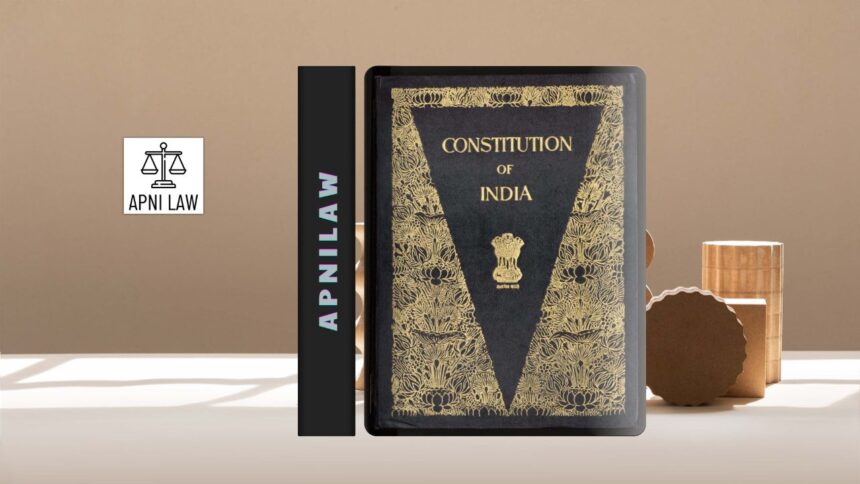Introduction
The Right to Equality is one of the most powerful guarantees in the Indian Constitution. It appears in Articles 14 to 18 and promises fair treatment for all citizens. This right forms the backbone of Indian democracy because it prevents discrimination and ensures that the law applies equally to everyone. The framers of the Constitution knew that India’s diversity could only thrive if all citizens enjoyed equal rights and opportunities.
By studying Articles 14–18, we understand how the Constitution works to create justice, dignity, and inclusiveness in society.
Article 14: Equality Before Law and Equal Protection of Laws
Article 14 states that no one is above the law. Every person, from an ordinary citizen to the highest official, must follow it. It also promises equal protection of laws. That means laws apply equally, but the State can still create special rules for fairness.
For instance, separate laws for protecting women, children, or weaker sections are valid as long as they are reasonable. Courts in India have often used Article 14 to strike down unfair laws and policies.
Article 15: Prohibition of Discrimination
This Article bans discrimination based on religion, race, caste, sex, or place of birth. In a society like India, where caste and social divisions were strong, this was a bold step.
The Article also allows the State to make special provisions for socially and educationally backward classes, Scheduled Castes, Scheduled Tribes, women, and children. Such measures form the basis of reservations in education and jobs. By doing this, Article 15 goes beyond words and creates tools for real equality.
Article 16: Equality of Opportunity in Public Employment
Article 16 focuses on government jobs and public employment. It says that all citizens must have equal opportunity to apply for these posts. Discrimination based on religion, caste, sex, descent, or place of birth is not allowed.
At the same time, the Constitution allows reservations for disadvantaged groups. This ensures that equality is not only formal but also practical. Courts have explained that equal opportunity does not always mean identical treatment. Sometimes, special steps are needed to balance the scales of justice.
Article 17: Abolition of Untouchability
Article 17 abolished untouchability and declared it a crime. This was a landmark move in Indian history. For centuries, Dalits and marginalized groups faced humiliation and denial of dignity. The Constitution put an end to this injustice.
Parliament supported this Article by passing the Protection of Civil Rights Act, 1955, and later the Prevention of Atrocities Act, 1989. Both laws punished acts of untouchability and violence against marginalized groups. Article 17 showed India’s resolve to end caste-based discrimination.
Article 18: Abolition of Titles
Article 18 banned titles that created artificial ranks in society. It abolished colonial honors such as “Raja,” “Maharaja,” or “Sir.” Only academic and military distinctions are allowed.
The Article also prevents citizens from accepting titles from foreign states without government approval. By doing so, it reinforced the idea that all Indians are equal in status.
Judicial Role in Protecting Equality
The Supreme Court has strengthened the Right to Equality through many judgments. In Indira Sawhney v. Union of India (1992), it upheld reservations for Other Backward Classes but set a 50% cap. In Navtej Singh Johar v. Union of India (2018), it decriminalized homosexuality, giving dignity and equality to the LGBTQ+ community.
These rulings show that the judiciary plays a vital role in keeping equality alive and relevant.
Contemporary Relevance
Even today, the Right to Equality remains central to India’s democracy. Gender bias, caste violence, and unequal access to resources remind us of the need for strong enforcement. At the same time, debates about reservation, economic criteria, and social justice prove that equality is an evolving idea.
The principles of Articles 14–18 now extend to new areas like digital rights, workplace fairness, and equal access to education. Equality remains a guiding light for the future.
Frequently Asked Questions
What does Article 14 guarantee?
Article 14 guarantees equality before the law and equal protection of laws. It means no citizen is above the law and everyone is treated fairly.
How does Article 15 allow reservations?
Article 15 bans discrimination but permits special provisions for backward classes, Scheduled Castes, Scheduled Tribes, women, and children. These measures promote real equality.
Why is Article 17 important?
Article 17 abolished untouchability and made its practice a punishable offense. It was a historic step toward social justice and dignity for marginalized groups.
Conclusion
The Right to Equality under Articles 14–18 is the foundation of Indian democracy. It not only promises fairness and equal treatment but also provides special measures to remove deep-rooted inequalities. By banning untouchability, prohibiting discrimination, ensuring equal job opportunities, and rejecting titles, the Constitution laid the groundwork for a just society.
The courts and legislature have kept this right alive and relevant. As India grows and faces new challenges, the Right to Equality continues to guide the nation toward justice, liberty, and dignity for all citizens.
For any specific query call at +91 – 8569843472







